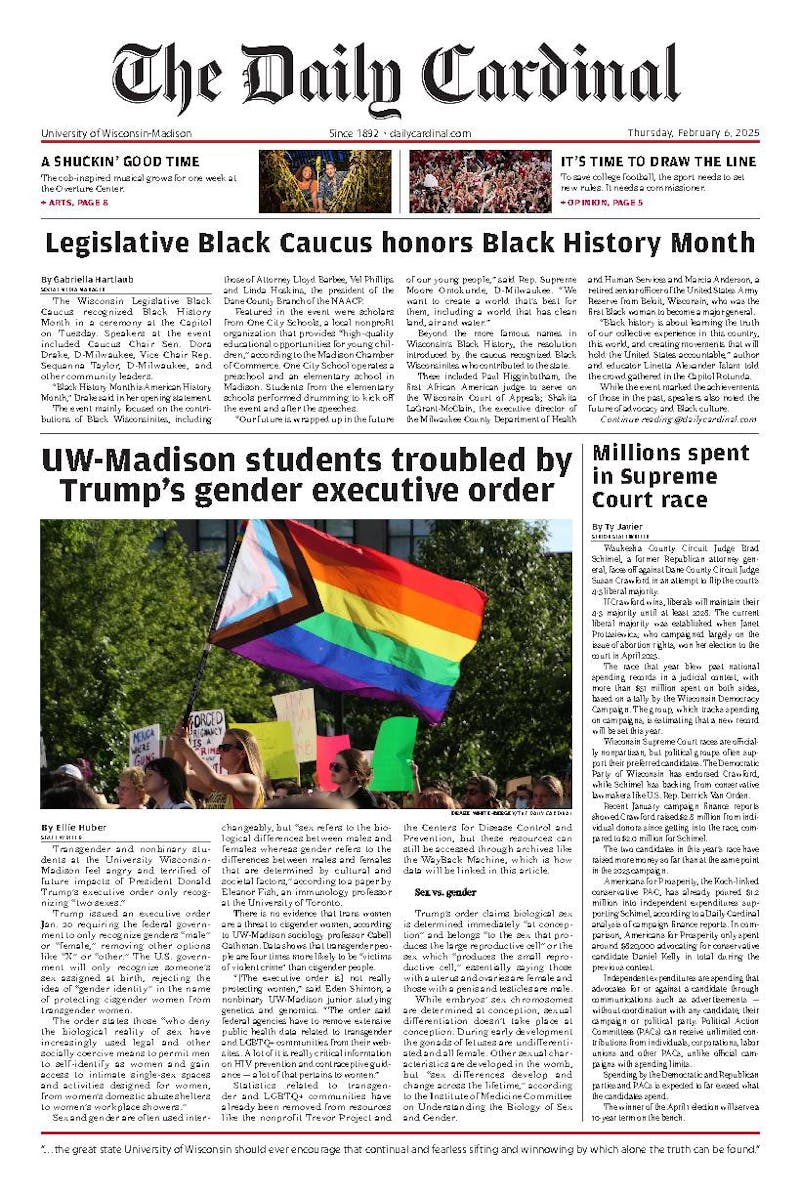Like it or not, celebrities have more power over the public's mindset than those in office. Laws deeming sexual assault and rape illegal are enforced in all 50 states, yet the entertainment industry depicts the crime in such a way that society perceives it as permissible.
This gives people in the spotlight a lot of power —power they often don't know how to use. Regardless of whether a celebrity means or wants to use her fame as a platform for certain issues, the platform exists, and her intent is irrelevant. ""Think about what you want to say before you say it"" seems like an obvious motto celebrities should follow, but this doesn't appear to be the case, and thus our impressionable society serves as the audience for misleading and dangerous messages.
Recently, Eminem released the song, ""Love the Way You Lie,"" featuring R&B superstar Rihanna. Its continual play on Top 40 radio made it one of the most talked about songs in the country, not only because of its popularity, but because of its suggestive nature. The lyrics include ""Just gonna stand there and watch me burn / Well that's alright because I love the way it hurts / Just gonna stand there and hear me cry / Well that's alright because I love the way you lie."" Many felt this message implied victims are unaffected by domestic abuse, and perhaps even get off on it. These original accusations only intensified when the song's music video, featuring Megan Fox in a physical fight that turns sexual, was released.
Both Eminem and Rihanna are survivors of abuse, and thus it's easy to say ""Love the Way You Lie"" is just an expression of what they went through. While it's important victims find closure however they can, they need to remain conscious of their audience, something this song failed to do. They aren't obligated as artists to be advocates for issues, but to release a song of this nature is wrong. Not only is it ignorant of reality, it's dangerous. Anytime perpetrators can draw excuses for their actions, society is in danger, and thus such romanticized depictions should be avoided.
Popular movies also play a role in promoting dangerous practices. Many have criticized ""Twilight"" for romanticizing stalking, as Edward's infatuation with Bella includes criminal habits. So too has ""Wedding Crashers"" turned sexual assault into the butt of a joke—Isla Fisher's tying of Vince Vaughn to a bed and forcing him to have sex with her is unquestionably rape.
That's not to say sexual assault shouldn't be discussed in pop culture. On the contrary, it's important that this discussion be amplified, but only so long as comments are healthy and productive. As funny as movies like ""Wedding Crashers"" may be, sexual assault is no laughing matter. This is a real issue affecting real people. When pop culture bombards us with images that romanticize or make light of rape, society is desensitized to the horror victims of assault live with everyday.
There are ways pop culture can depict sexual assault so that the message isn't disrespectful.
""Mad Men"" is a show that consistently focuses on gender relations. The amount of sexism the series portrays inevitably makes viewers uncomfortable, but there's no question this depiction is meant to illuminate the injustices once accepted in the American workplace. Joan is the sultry secretary who fulfills every stereotype women of the time were expected to embody. Last season, Joan found herself in a marriage devoid of any intimacy. No matter how much she tried to talk to her husband, Greg, about sex or get him in ""the mood,"" she couldn't seem to tear down the wall between them.
In an attempt to prove a point, Greg shows up drunk to Joan's office one night and tries to persuade her to have sex with him. Objection after objection, Greg eventually forces Joan to the ground and assaults her, rendering her powerless in the area she usually holds all the power. In the scene, all that is shown is the look on Joan's face: scared, mortified and miserable, and it's enough to convey the severity of the deed. There is nothing funny or sexy about the rape. It's honest, a trait all representations of sexual assault must include.
But a healthy image pertaining to sexual assault doesn't always need to be jarring. In many movies, sexual consent isn't dwelled upon, but instead depicted as the social norm it should be. In ""Juno,"" Paulie asks, ""Can we makeout now?"" before kissing Juno. ""The Notebook"" also touches on consent; Noah makes sure Allie wants to have sex before actually doing so. It's simple, but gets the point across.
In the end, we need to focus on the message sent to audiences. It doesn't matter whether or not an entertainer wants to be an advocate or if sexual assault is discussed in a dramatic or comedic setting. It's about the fact that these acts occur beyond the screen, and so long as pop culture icons address sexual assault carelessly, so too will society. It is everyone's job, regardless of stature, to treat this issue with respect. Whether speaking to one or to a million, our audience is capable of sparking change. For that reason, not only do celebrities need to think before they speak, but so do we. When that is accomplished, progress will be made.
For any questions or comments please contact uwpavemedia@gmail.com.






